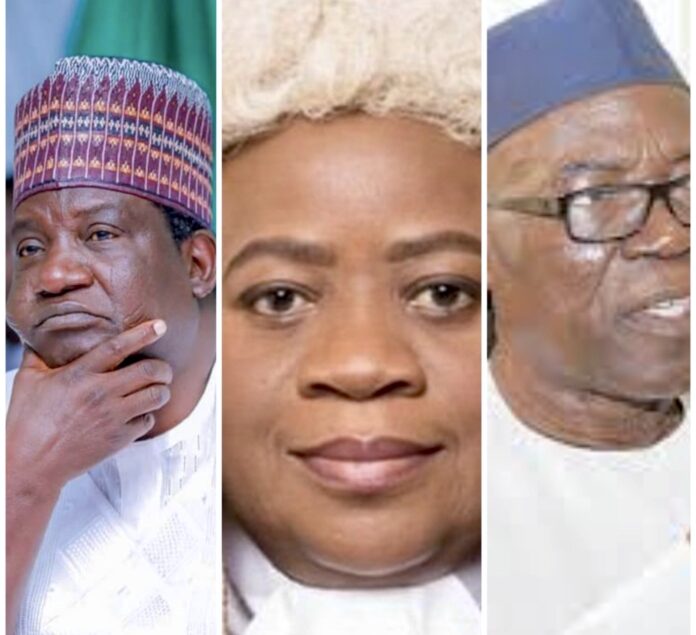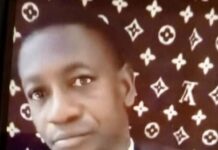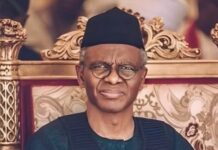Photo:L-R, Lalong, Dongban-Mensem, Useni.
Plateau APC and Appeal Court’s integrity crisis
By Ukandi Odey
These are certainly uncommon times for Plateau State and Nigeria’s Appeal Court under the presidency of Plateau State-born Justice Monica Dongban-Mensem.
Interestingly, what is unfolding gradually as the most infamous leadership of the appellate court in the history of post-independence Nigeria judiciary has its no less despicable and lugubrious origins in Plateau politics, sphere and political firmament.
It also sounds like the tale of the medicine man disclosing the strengths of his talisman before the contest gets underway.
Once the All Progressives Congress, APC, was rejected roundly by the people of Plateau State in the last general elections, in which, as incumbent governor, Simon Bako Lalong himself historically lost his senatorial bid by more than fifty seven thousand votes, the party’s footsoldiers have been licking their wounds with loud boasts that the State APC’s strength is at the Appeal Court.
In their numbers and flock, they have been ubiquitous and proudly loud-mouthed that whatever the State APC lost at the polls or at the level of the elections petition tribunals, it will recover at the Appeal Court because it owns and controls the leadership of that arm of the federal judiciary.
Two versions of story – the one leading to the other – are commonplace in socio-political circles in Plateau as to why the Appeal Court President is indebted to the State APC, and why the payment time is now, using the judiciary as the denominator.
According to sources in Plateau, the Appeal Court President owes her movement to the federal judiciary to retired General Jeremiah Timbuk Useni, who used his position as Minister of the FCT during the dark days of the military junta of the late General Sani Abacha, to effect her transfer of service from the Plateau State judiciary.
General Useni is an aggrieved Plateau PDP mogul who has been having the woeful side in an unnecessary power tussle with Jonah David Jang, a retired Air Commodore and former civilian governor of Plateau State.
Useni is rumoured to have enlisted the technical assistance and collaboration of Justice Dongban-Mensem to use the Appeal Court to neutralise and deprive the PDP of its hard-earned electoral success in the 2023 polls in the State to avenge his pain and sense of loss against Jonah Jang and the state PDP as a whole.
According to unconfirmed sources, Justice Monica Dongban-Mensem allegedly promised Useni that she would put in her all to assuage his condition.
The second version of the story is traced to Simon Lalong’s tenure as governor of Plateau State and the eventual emergence of Justice Dongban-Mensem as the president of the Appeal Court, Nigeria.
According to sources and power brokers in the State chapter of the APC, Lalong used his influence, connections, and resources as Governor to ‘pay’ and secure the position of President of the Appeal Court for Justice Dongban-Mensem, who is not just from Plateau State, but hails from Shendam Local Government Area in Plateau South senatorial district as Lalong himself.
According to the same sources, Justice Dongban-Mensem is morally indebted, and bears a burden of duty to both Useni and Lalong, and has ‘God’ to thank that the interests of the duo are twinned in a common interest that can be settled by judicial subterfuge.
At the end of regulation time, the various elections tribunal panels were not agreed on point of law.
While giving judgement in the various petitions brought before them, the panels took different views and stance on a basically internal, and pre-election matter, and accordingly entered judgment in favour of the APC to the effect that candidates of the PDP were not validly nominated because the “PDP in Plateau State had no structures”.
The contention of this judgement which invalidated the PDP majority elected positions in the state outraged common sense, especially as the tribunal was popularly adjudged to have gone outside its originating mandate, which was based on matters arising from the 2023 general elections as conducted.
When it was announced that all appeals arising from the judgments of the Election Petition Tribunals will be heard in only Lagos (for the States in South of Nigeria) and Abuja (for States North of Nigeria), some discerning readers of the situation were quick to point out that Justice Dongban-Mensem was using an administrative loop to perfect an agenda.
This was because some members of the APC in Plateau State had made it an open secret that their party would be restored to power at the Appeal Court superintended over by Justice Dongban-Mensem.
Since the appellate tribunals started disposing of the cases before them about a fortnight ago, the trend, for Plateau, has been like a dress rehearsal, a seeming photo finish, or some fait accompli, and confusion let loose by the judiciary.
While judicial precedents and points of law as well established were adopted to predicate the logic of deductions, conclusions, and judgements, for Plateau State, the judgements given so far lack the planks and platitude of established authority, established precedents, settled law, and elementary sense.
Like a poem without regular rhyme and rhyming scheme, the judgements of the appellate tribunal for Plateau North Senatorial District, Jos North/Bassa Federal Constituency, and Shendam, Mikang, Qua’an Pan Federal Constituency, are jurisprudentially curious and spurious, professionally ridiculous, ethically indulgent, and laughable even for the legally uninitiated.
For instance, citing lack of structure and improper nomination, the Appeal Tribunal in the case of Plateau North senatorial election, nullified the election of PDP’s Simon Mwadkon, the Senate Minority Leader, and ordered a rerun election within ninety days, with “all the parties herein” to participate in the rerun.
The same panel also, in the judgment for Jos North/Bassa Federal Constituency, citing same grounds of lack of structure and improper nomination, nullified the election of PDP’s Rep. Musa Agha, ordered rerun election within ninety days, but excluded the PDP expressly from the rerun election.
In the case of Shendam, Mikang, Qua’an Pan Federal Constituency, the appeal panel nullified the election of PDP’s Rep Isaac Kwallu, and outrightly ordered INEC to issue a certificate of return to APC’s John Dafaan, who, during the February election, won in only one out of thirty three federal polling units in the constituency!
Authorities and settled precedents are either being ignored, or have not been adhered to in determining cases from Plateau, with the impression being created that officialdom is conniving and collaborating to impose the APC on the people of Plateau even when it does not reflect and represent their interests.
Apart from the much cited rulings of the Supreme Court, which held that issues of nomination and sponsorship are internal to individual political parties and are pre-election in nature, it has also been established and settled that a candidate of another party cannot sue a candidate based on nomination and sponsorship, except he is a candidate of the same party claiming wrong substitution.
Besides, flouting a court order or lack of it, is not condition in law for valid nomination and sponsorship, just as primary elections from which candidates emerge are conducted by the National Working Committees of the various parties, not the State excos of the parties, and this translates to the charge of “no structure” against the Plateau PDP to naught.
The Nigerian judiciary, particularly the Appeal Court under the leadership of Justice Monica Dongban-Mensem, has been brought under disrepute and global ridicule with all charges of judicial corruption being thrown at it.
As discussions and debates rage on the conduct of the judiciary, election cases, and the quality of judgment and justice from the country’s court system, the recurrent questions are whether the court is still the hope of the common man? Or can the judiciary heal itself in a vital recuperation effort to recover its lost integrity?







